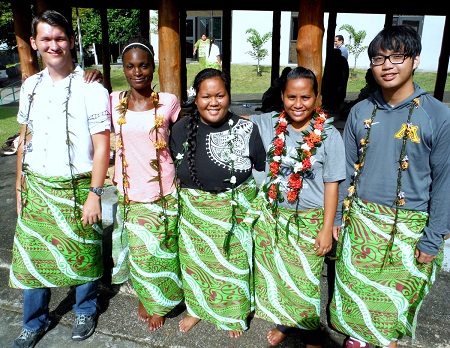
As part of the 2015 Summer Experiential Learning Program, five students from across the US Pacific will spend just under three weeks as interns with ASCC-CNR ths month. See here (l-r) are Richard Clark (Marshall Islands), Imani Dailey (US Virgin Islands), Daffodil Silver Wase (Marshall Islands), Elizabeth Augustine (Micronesia), and Chieriel Desamito (Guam). Photo: J. Kneubuhl.

As part of the 2015 Summer Experiential Learning Program, five students from across the US Pacific will spend just under three weeks as interns with ASCC-CNR ths month. See here (l-r) are Richard Clark (Marshall Islands), Imani Dailey (US Virgin Islands), Daffodil Silver Wase (Marshall Islands), Elizabeth Augustine (Micronesia), and Chieriel Desamito (Guam). Photo: J. Kneubuhl.
ASCC-CNR Hosts Summer Interns from US Pacific
June 2, 2015
By James Kneubuhl, ASCC Press Officer
With its verdant landscape and ideal growing conditions for Pacific flora, American Samoa makes an ideal laboratory for the study of Tropical Agriculture. Five students from across the US Pacific will spend just under three weeks this month familiarizing themselves with the research, instruction, and extension programs underway at the Community & Natural Resources (CNR) division of the American Samoa Community College (ASCC), as well as some of the major research entities in the Territory, as part of the 2015 Summer Experiential Learning Program, hosted for the first time by ASCC-CNR.
The five summer interns are Miss Elizabeth Augustine from the College of Micronesia in Pohnpei; Miss Daffodil Silver Wase and Mr. Richard Clark from the College of the Marshall Islands; Mr. Chieriel Desamito from the University of Guam; and Miss Imani Dailey from the University of the Virgin Islands. Each of them majors in Agriculture or a closely related field at their home institution, and during their time in American Samoa, the group will observe and occasionally participate in all of the research and outreach activities at CNR, alternating with excursions to other science-centered agencies such as the NOAA Ocean Center, the Fogama’a Marine Sanctuary, the National Park Center, the Department of Marine and Wildlife, the Environmental Protection Agency, and the Department of Agriculture.
CNR welcomed the interns this week with an ava ceremony overseen by Acting Director Aufa’i Apulu Ropeti Areta. Activities during their first week will include grafting, air layering and propagation at the Fruits for Life Greenhouse, as well as seed collection and transplanting with the Forestry division. Over the course of their visit, they will also take a Hydroponics tour with Dr. Ian Gurr, familiarize themselves with American Samoa’s insect population during an Entomology overview and activity with Dr. Mark Schmaedick, and spend time with the Animal Science, Agriculture Extension and 4-H divisions of CNR. All of this is in addition to their visits to a number of off-campus locations, including a trip to Aunu’u to observe the island’s unique natural environment.
The interns’ main CNR chaperones are instructors Mr. Ionatana Fasavalu and Mrs. Pauline McFall, along with Greenhouse Technician Miss Eirenei Tesimale and student assistants Keith Metuli and Mine Lilomaiava. Funding for the interns’ visit to American Samoa is provided by their home institutions under the newly-established Summer Experiential Learning Program, formerly known as the CariPac Summer Internship Program.
Formed in 2005, CariPac, short for the Caribbean and Pacific Consortium, was a consortium of institutions of higher education in Guam, the Northern Mariana Islands, American Samoa, Puerto Rico, the U.S. Virgin Islands, the Federated States of Micronesia, the Marshall Islands and Palau. CariPac facilitated the leveraging of these institutions’ respective resources to develop collaborative efforts and strengthen their own programs. Recently, the US Department of Agriculture discontinued funding consortium entities, so each US territory is required to apply for resources individually rather than collectively. However, the connections forged during the CariPac collaboration have held strong, and the shared internship program between the US territories now continues as the Summer Experiential Learning Program.
